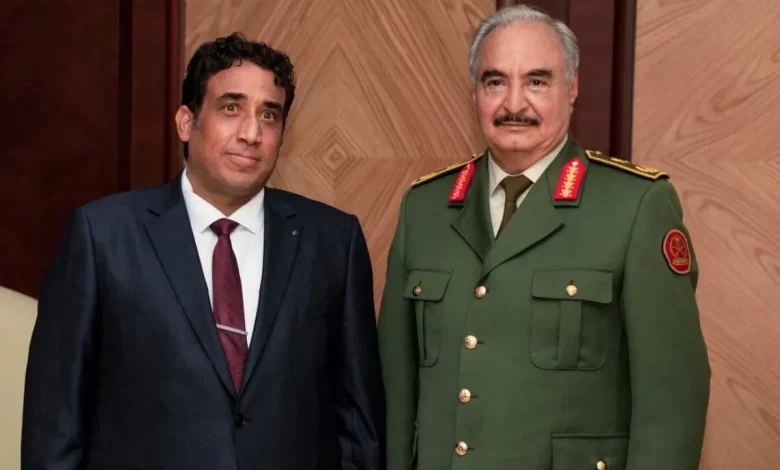Al-Menfi and Haftar in Cairo to Break Political Deadlock

Western threats to impose sanctions on obstructionists in Libya’s political settlement gave momentum to meetings between the parties in a scene that seemed to imply that the crisis, particularly the election dilemma, was moving toward a solution soon, but the reality on the ground indicates otherwise.
In the latest move, Egypt brought together senior Libyan officials, led by Presidential Council President Mohamed al-Menfi, Libyan Army Commander Khalifa Haftar and a number of officials from eastern and western Libya.
This meeting comes amid a political movement entitled “Preparations for General Elections.” This is an option that all parties are clinging to, despite the absence of a consensus platform and the continuing disputes in public and secret.
Both al-Menfi and Haftar met in Cairo on Monday at the invitation of the Egyptian government to discuss the latest developments and reach a compromise formula that supports the elections and national reconciliation.
The Libyan media platform “Fawasel” reported, citing unnamed sources, that “the meeting between al-Menfi and Haftar was held at the invitation of Egypt after the initiative of the Presidential Council.”
They discussed “the involvement of all parties in the political process, the establishment of fair and comprehensive financial arrangements, the unification of the military institution for the protection of borders, the fight against smuggling and illegal migration, and mechanisms for achieving reconciliation, the return of the displaced and reparation for damages,” it added.
According to the platform, the meeting “is part of an initiative by the Egyptian side to bring the two figures together, following growing international and local acceptance of the ideas of the Presidential Council to complete the elections and a conviction that the rest of the political tracks are stumbling and that no solution can be found satisfactory to everyone”.
The Presidential Council proposed an initiative to resolve the political crisis in the country and to break the political deadlock. The initiative would return the conflicting parties to dialog in order to achieve the constitutional rule, which would establish parliamentary and presidential elections and end the transitional stages.
However, both the House of Representatives and the State Council, which jumped at the initiative of el-Menfi and held a meeting in Cairo last week, announced their agreement on a constitutional document and on a clear and specific roadmap to be announced later, to complete all the necessary measures to complete the electoral process, be it on foundations and laws, or on executive procedures and unifying institutions.
Khalid al-Mishri justified the refusal of the House of Representatives and the Supreme Council of the state to participate in the meeting that was to be held in Ghadames on the eleventh of January, by saying that their meeting in Cairo was predetermined, and that he and Aguila Saleh had not stopped communicating during the past period.
The meeting between al-Menfi and Haftar is the second since their meeting on 11 February 2021.
Since March, Libya has been embroiled in a political struggle between two governments: the unity government in Tripoli led by Abdul Hamid Dbeibeh refuses to hand over power except to a government appointed by a new elected parliament, and the stability government headed by Fathi Bashagha, appointed by the House of Representatives and temporarily based in Sirte.
To resolve the crisis, the United Nations has initiated an initiative that led to the formation of a joint committee of the House of Representatives and the Supreme Council of the State (Parliamentary Consultative Assembly) to agree on a constitutional basis for holding parliamentary and presidential elections, but this process has stalled.
On 8 December, the Presidential Council launched an initiative to hold a dialog forum between the three councils (presidential, parliamentary and state) in the presence of UN envoy to Libya Abdoulaye Bathili.
Libyans hope the elections will lead to a transfer of power and end the political and armed conflicts that have plagued their oil-rich country for years.












